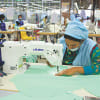'Buyers want deliveries in hours, we are taking weeks'

Global buyers for leather goods and footwear now want their orders delivered faster than before, requiring local manufacturers to respond promptly. And this calls for easing customs procedures and ensuring faster clearance of goods to facilitate export growth, according to market players.
"We are offering deliveries in weeks while customers are asking for deliveries in hours," said Syed Nasim Manzur, president of the Leathergoods and Footwear Manufacturers and Exporters Association of Bangladesh (LFMEAB), urging for faster clearance from customs.
He shared this information in an interview with The Daily Star yesterday, on the sidelines of the 4th Bangladesh Leather Footwear & Leathergoods International Sourcing Show 2023 at the International Convention City Bashundhara in Dhaka.
The three-day event, that began on Thursday, aimed to showcase the strength of local leather goods and footwear makers as capable suppliers in order to bolster export earnings from the sector.
Bangladesh exported $1.7 billion worth of leather goods and footwear in fiscal year 2022-23 and it can increase these exports to $5 billion in five years, he said at the opening of the exhibition.
Bangladesh registered increasing entry of new factories in the leather goods and footwear industry in recent years, leading to rising export growth.
This gives the country hope of gaining a greater share of the global market for leather goods, where the demand for footwear alone is estimated at $175 billion, according to the LFMEAB president.
Manzur, also managing director of Apex Footwear Ltd, the largest footwear exporter of Bangladesh, said demand in the global market is low at present.
"There is oversupply in all major markets, especially the US, Europe and Japan. As a result, demand has slowed sharply since June and is not expected to recover until mid-2024. So, business will suffer," he added.
As such, the implementation of reforms, reduction of lead time, and rationalisation of tariff is necessary for the sector to accelerate exports.
He said at the event, a clear direction has come from the prime minister regarding equal treatment for all sectors.
"The has been a realisation at the highest level of government to reduce bureaucracy and increase the speed of implementation of various decisions. The announcement of formation of the leather development authority (by the prime minister) is a major step forward for the sector," he added.
Another issue that came up at the event was the need for rationalisation of tariff on necessary accessories and raw materials for re-export beyond the bonded warehouse system, which is an opportunity for exporters to bring raw materials at zero duty to make products for export.
"This is very important. Large exporters can avail the bonded warehouse facility. But it is not possible for small factories to comply with bonded warehouse rules as it is very complex and expensive. If you want to bring small factories to the export chain, you have to provide easy access to imported raw materials," Manzur said.
He suggested the government offer the opportunity to exporters to import raw materials and accessories at 2 percent tariff for certain period.
"Last but not least, the simplification of rules is needed to reduce lead time so we can increase our exports," he said, adding that the highest level of policymaking is very clear about what is needed.
Manzur also said it is necessary to be sensitive about the need for urgency at the mid-level, where the actual work related to documentation and clearance is dealt with.
He said another major accomplishment of the exhibition was that partners of leather goods and footwear makers joined the supply chain.
Diversified products, including non-synthetic leather bags, new kinds of footwear such as technical and work boots, were also exhibited at the fair.
"New partners localising the supply chain is very encouraging," he said, adding that buyers from India, Poland and South America also attended the show.
The show discussed moving the beyond Leather Working Group, a global body for compliance and environmental certification in the leather and leather goods sector, to the Sustainable Leather Forum (SLF) so that the local industry can be included in the global value chain.
The SLF is the first international event dedicated to CSR (corporate social responsibility) in leather industries.

 For all latest news, follow The Daily Star's Google News channel.
For all latest news, follow The Daily Star's Google News channel. 








Comments